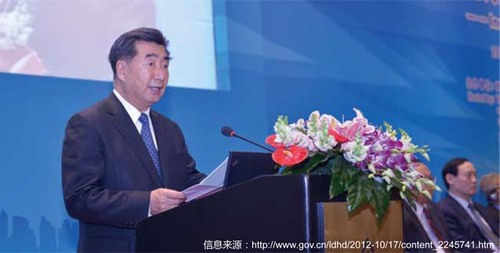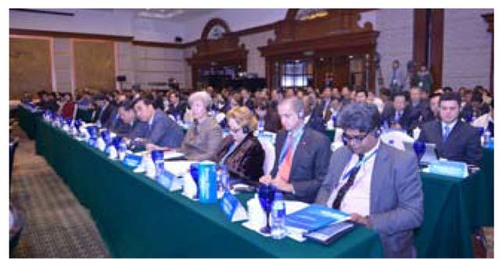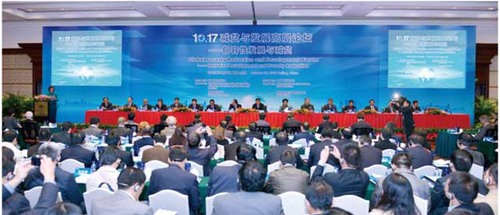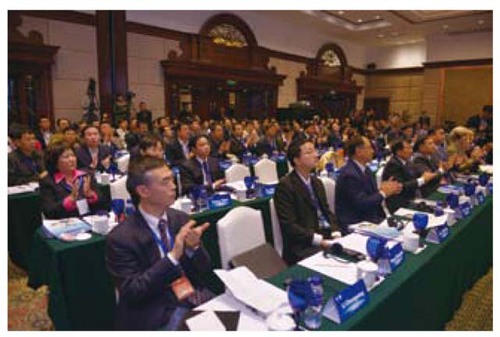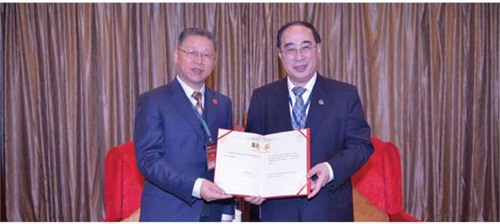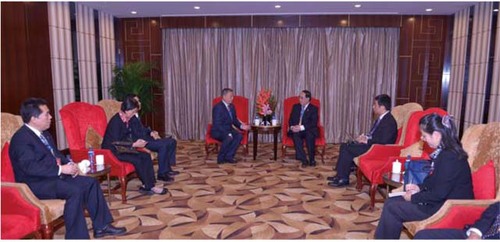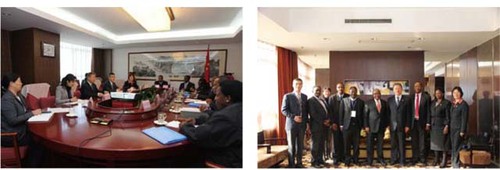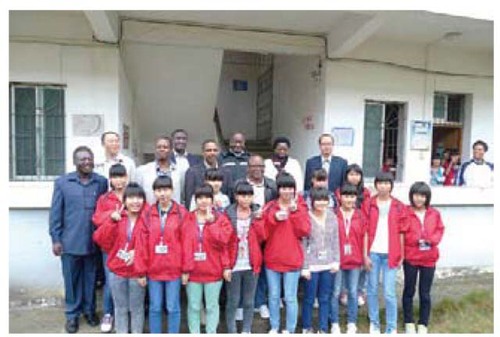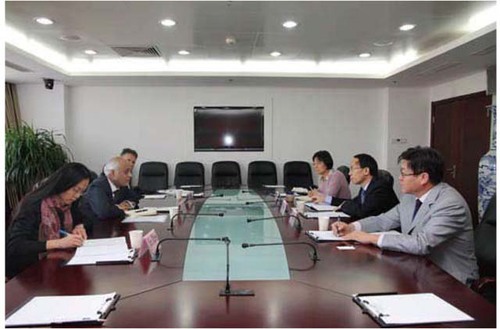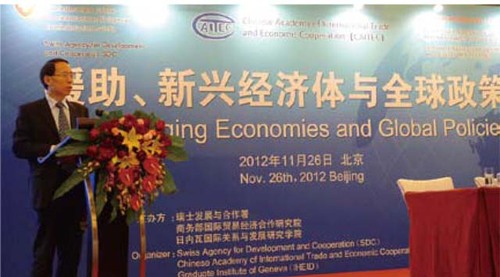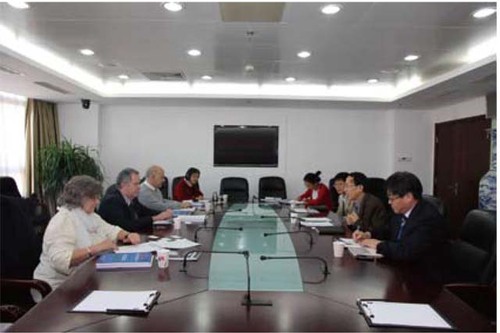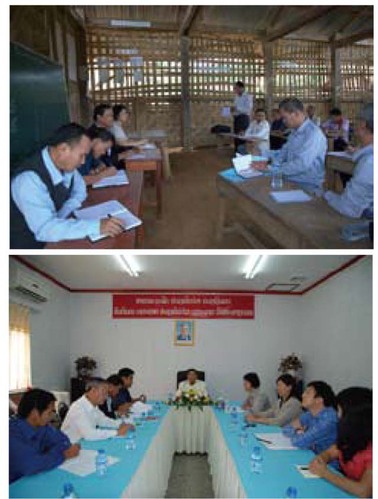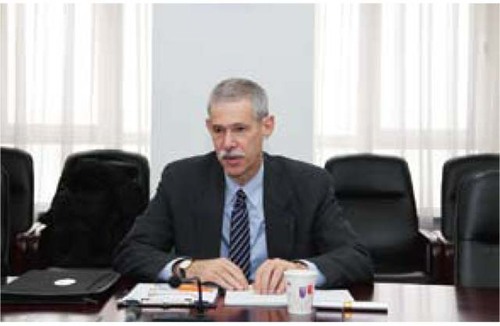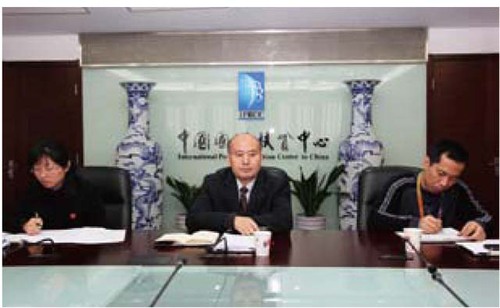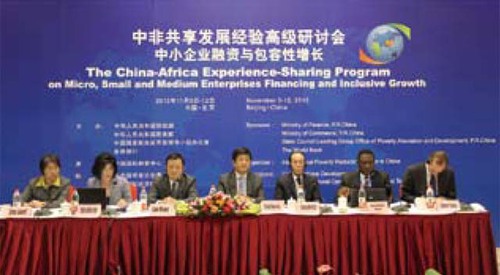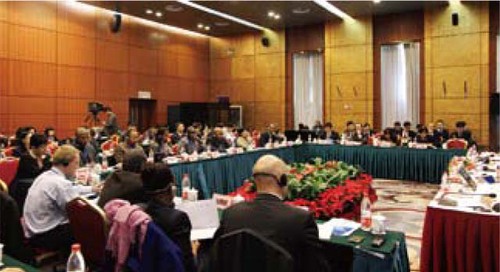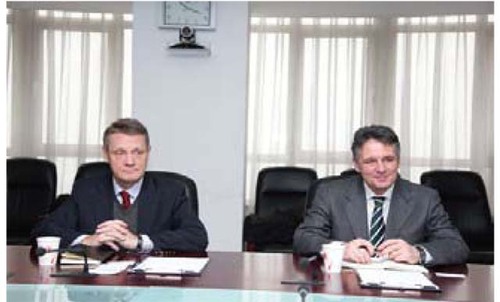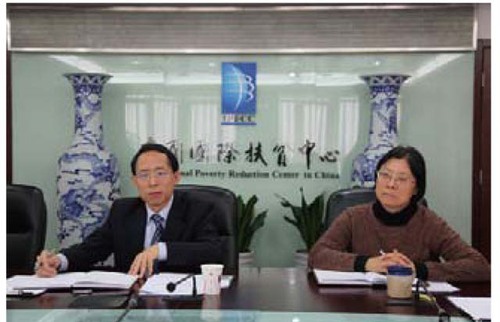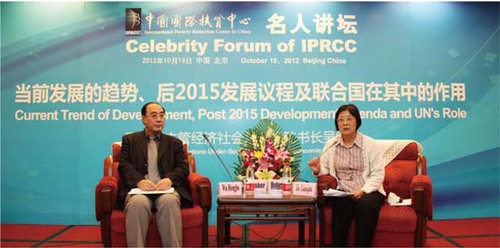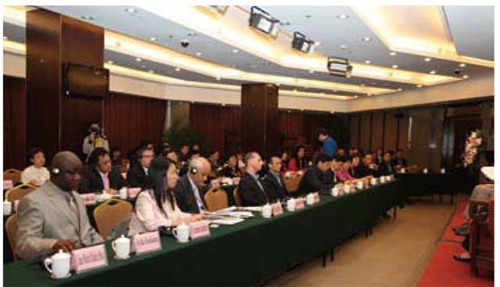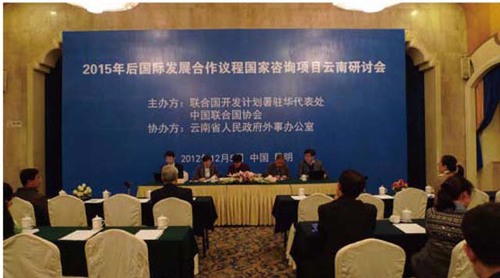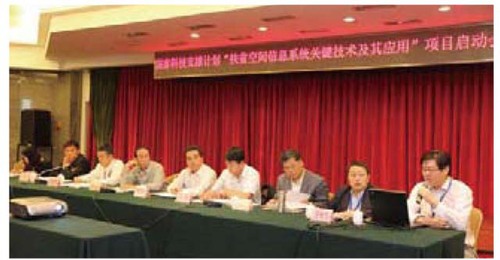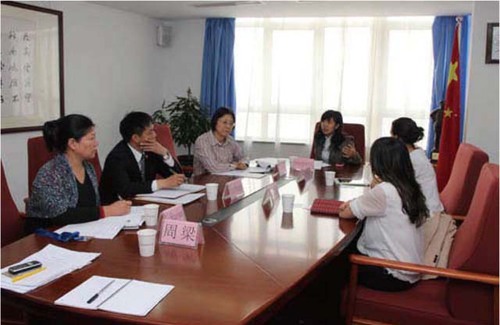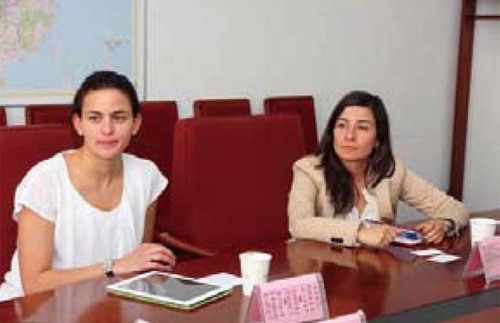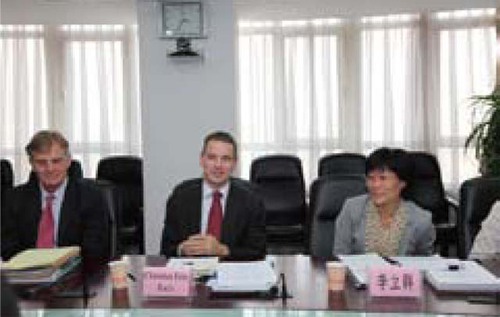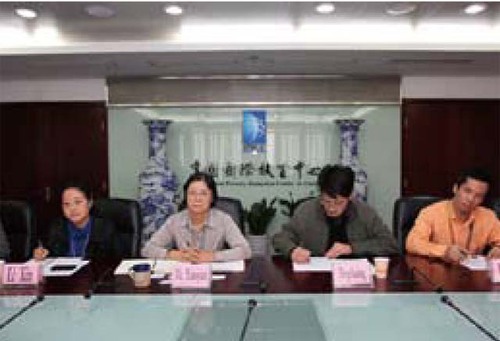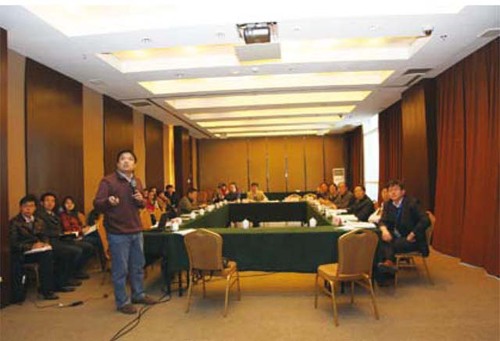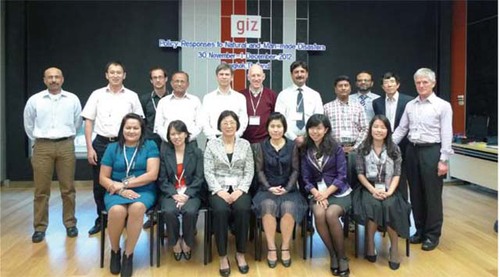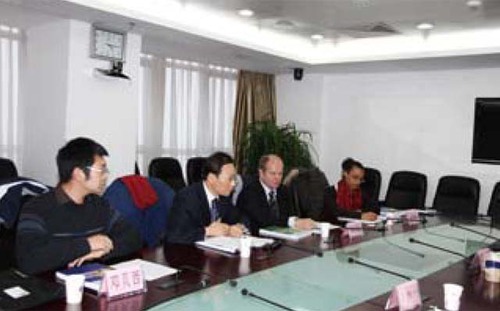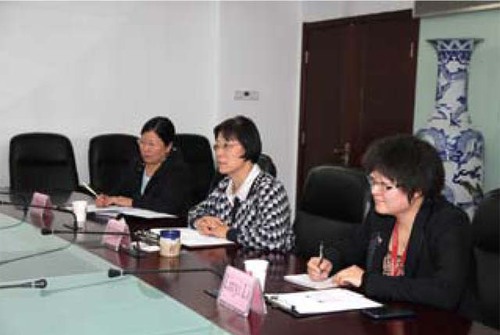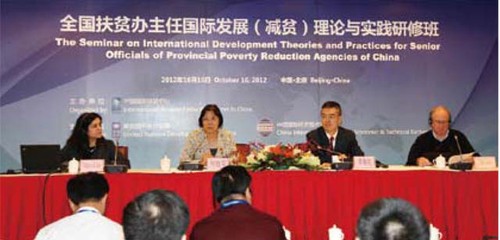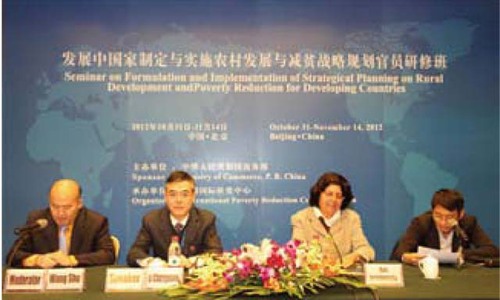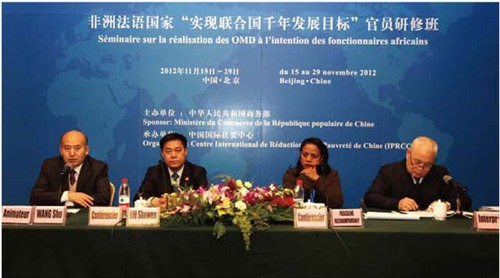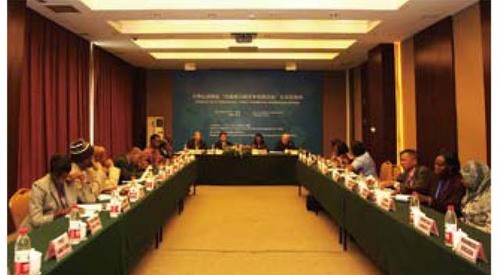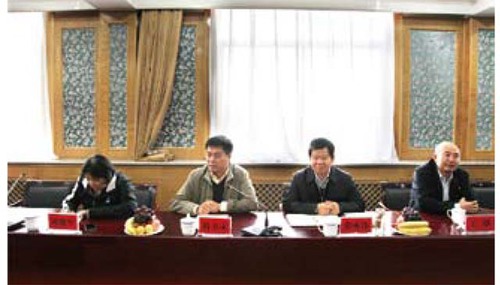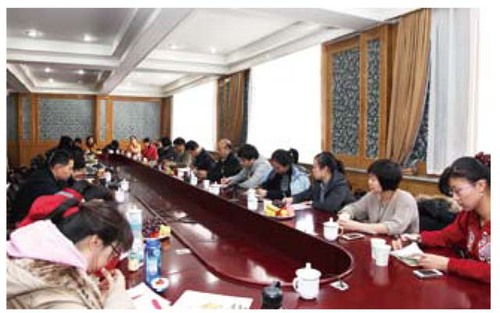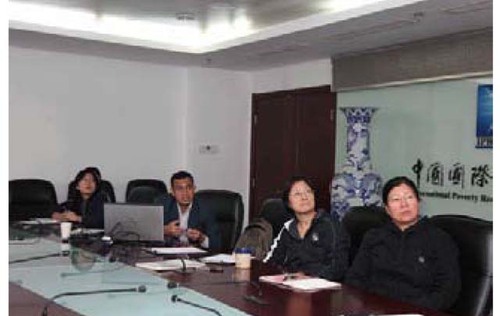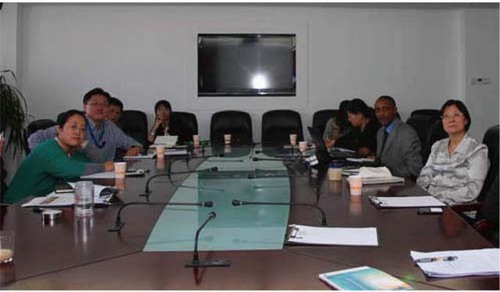The fourth quarter of 2012 quarterly
Events in Focus
Vice Premier Hui Liangyu Addresses the Opening Ceremony of the Global Poverty Reduction and Development Forum
October 17, 2012 --- The Global Poverty Reduction and Development Forum was held in Beijing, to mark the 20th International Day for the Eradication of Poverty. Hui Liangyu, Member of the Political Bureau of the CPC Central Committee and Vice Premier of the State Council addressed the opening ceremony on behalf of the Chinese government. He emphasized that the Chinese government has vigorously committed itself to pursuing inclusive development to guarantee provision of equal development opportunities and sharing of the fruits of economic growth for the poor. He also pointed out that the government should continue to implement the Outline for Development-oriented Poverty Reduction for China's Rural Areas (2011-2020), focus on extremely poor areas that lie in contiguous stretches, provide more financial and policy support, ensure better subsistence and more assets, improved ecological environment, enhanced development capacity and narrowed development gaps so as to improve the economy and society in poor areas.
Hui Liangyu noted that, in the recent ten years, the Chinese government has taken a series of poverty reduction actions to create a favorable development environment and more development opportunities for the poor areas, in the principle of scientific outlook on development and people-oriented ideas, with more attention paid to pursuing comprehensive, balanced and sustainable development, making overall plans with all factors taken into consideration and ensuring and improving people's livelihood. He indicated that the Chinese government has devoted itself to helping the poor in rural areas to benefit more from the social and economic development by carrying out large-scale poverty reduction measures, increasing poverty alleviation funds at all levels and combining development-oriented poverty reduction with social security system.
Hui Liangyu also stressed that both China and other countries need to achieve more inclusive development, change the development modes and improve development quality so as to promote the well-being of the people. To this end, he put forward three proposals: (a) deepen the reform to promote poverty reduction by institutional construction, including establishment of economic systems favorable for the poor and provision of equal public services for the poor; (b) exploit our advantages to the full to improve economic development quality through reasonable adjustment of industrial structure based on resource endowment and harmonious development of capital-intensive industry, technology-intensive industry and labor-intensive industry; (c) build innovative mechanisms to strengthen international exchanges and cooperation in poverty reduction.
With the theme of “Inclusive Development and Poverty Reduction”, the Global Poverty Reduction and Development Forum was co-hosted by the State Council Leading Group Office of Poverty Alleviation and Development (LGOP) and the UN office in China. More than 200 people attended the Forum, including officials from Chinese central authorities and government agencies, senior officials from the UN, government officials from the countries concerned, internationally known specialists and scholars and representatives of social organizations. UN Secretary-General Ban Ki-moon specially sent his congratulatory letter to the forum.
Source: http://www.gov.cn/ldhd/2012-10/17/content_2245741.htm
Global Poverty Reduction and Development Forum – Inclusive Development and Poverty Reduction Held in Beijing
October 17, 2012 --- Upon the 20th International Day for the Eradication of Poverty, the Global Poverty Reduction and Development Forum – Inclusive Development and Poverty Reduction was hosted by LGOP and UN System in China, and organized by IPRCC and UNDP China in Beijing. Hui Liangyu, Member of the Political Bureau of the CPC Central Committee and Vice Premier of the State Council addressed the opening ceremony on behalf of the Chinese government (see the press release of the Xinhua News Agency).
LGOP Director Fan Xiaojian delivered a keynote speech at the forum. First off, Director Fan mentioned that in 2011. In 2011, the Central Party and the State Council promulgated and implemented the Outline for Development-oriented Poverty Reduction for China's Rural Areas (2011-2020) and held the Central Development-oriented Poverty Reduction Working Conference, marking a brand-new stage for poverty alleviation and development in China. Here are some of the important changes of anti-poverty work: first, the meaning of poverty line has changed from ensuring subsistence to promoting development; second, the major task has changed from providing basic subsistence to ensuring better subsistence, more assets, improved ecological environment, enhanced development capacity and narrowed development gaps; third, the basic principle has changed from development-oriented poverty reduction to two-wheel-drive poverty alleviation. The state has made development-oriented poverty reduction the major way of reducing poverty. Social security system was made basic means to ensure food and clothing; fourth, the way of work has changed from poverty reduction by special programs alone to the tripartite structure of poverty relief by specific projects, by industry and by society; fifth, the regional targeting has changed from targeting county and village to targeting extremely poor areas that lie in contiguous stretches; and sixth, policy measures have changed from generally benefiting rural China to favoring poor areas and poor populations based on general benefiting.
Fan pointed out that poverty reduction and development in China is now at a historical turning point, facing both new opportunities and new challenges. China is still a developing country featuring a relatively low level of per-capita income, noticeable unbalanced regional development, deep-seated rural development bottlenecks, numerous impoverished residents, frequent cases of sinking back into poverty, and contiguous underdeveloped areas, so it is obvious that the task of poverty reduction and development is still arduous. To drive inclusive development and poverty reduction, the government will act in accordance with the objective of building a moderately prosperous society in an all-round way by 2020 and continue promoting simultaneous development of industrialization, informatization, urbanization and farming modernization in poor areas and coordinating development of urban-rural and regional development.
In his speech, Director Fan also noted that International cooperation and experience are key parts of China's efforts in poverty reduction. We will innovate mechanisms and widen channels to enhance anti-poverty exchanges through "bringing-in" and "going-out".
LGOP Director Fan Xiaojian Meets with UN Under-Secretary-General Wu Hongbo during the Global Poverty Reduction and Development Forum
October 17, 2012 --- LGOP Director Fan Xiaojian met with UN Under-Secretary-General for Economic and Social Affairs Wu Hongbo during the Global Poverty Reduction and Development Forum and presented a letter of appointment to him as a senior consultant for International Poverty Reduction Center (IPRCC).
During the meeting, Fan Xiaojian briefed Wu on the founding background of IPRCC, its purposes and responsibilities and major work done since its establishment. Fan also conveyed his expectation that the UN Under-Secretary-General could put forward some valuable suggestions to help IPRCC to carry out better international exchanges and cooperation in poverty reduction and improve its institutional capacity, working performance and international influence.
Wu Hongbo expressed his sincere thanks to Fan and IPRCC for their confidence in him and said he would do his best to serve IPRCC. Wu mentioned that, with more than 1 billion people live in poverty all over the world, poverty reduction, as an arduous global task, still has a long way to go. Among those living in poverty, one tenth are Chinese. Therefore, it is of more significance to hold on to poverty reduction for China. He said, as IPRCC is engaged in pioneering work and lays particular emphasis on South-South cooperation, in order to achieve better international exchanges and cooperation in poverty reduction, IPRCC employees shall be open-minded.
Both UN and the international community have highly recognized the achievements made by China in poverty reduction. IPRCC commits itself to achieving more results with less input and working closely with other developing countries to reduce poverty. In addition, it also makes great efforts to maintain a good image of China in the international community.
The idea of inclusive and sustainable development has been put forward for a rather long period. However, it is still not widely accepted. For example, only 30% of the world population live in developed countries, but they consume 80% of all the resources and energy, leaving 20% to the 70% people in developing countries. Furthermore, serious waste of food is very common in developed countries, which is obviously unsustainable. In response, the United Nations set up the Millennium Development Goals. In order to achieve these goals, we have to change the way we work and live, practice strict economy and advocate the use of renewable energy sources. To adapt to such a development trend, China shall carry out poverty reduction with sustainable development taken into consideration. In terms of macro development strategies, China shall set up its development goals from the perspective of sustainable development.
LGOP Director Fan Xiaojian Meets with World Bank President Jim Yong Kim
November 28, 2012 --- LGOP Director Fan Xiaojian met with a delegation led by World Bank President Jim Yong Kim.
At the meeting, Fan gave a brief review of the cooperation between the Chinese government and the World Bank in poverty reduction and introduced the new tasks and characteristics of poverty reduction in China at the new stage. Fan also discussed issues concerning poverty reduction through employment and micro-finance with the World Bank delegation. Mr. Jim Yong Kim indicated that the World Bank will continue to support China in reducing poverty and he expected that the LGOP could play a part in the knowledge sharing center jointly set up by the World Bank and the Chinese government to enhance international exchanges and cooperation in poverty reduction.
Some other relevant persons were also present at the meeting, including Jin-Yong Cai, Executive Vice President and CEO of IFC, Pamela Cox, East Asia-Pacific Vice President of the World Bank, Klaus Rohland, World Bank Director for China, Yang Shaolin, Executive Director for China at the World Bank, Zheng Wenkai, Deputy Director General of LGOP, Li Chunguang, Director of the Department of International Cooperation and Social Poverty Alleviation of LGOP and its Deputy Director Liu Shuwen, Ou Qingping, Deputy Director of LGOP Foreign Capital Project Management Center, He Xiaojun, Deputy Director-General of International Poverty Reduction Center in China and head of related offices.
LGOP Director Fan Xiaojian Meets with Delegation of the Tanzanian Government
October 30, 2012 --- LGOP Director Fan Xiaojian met with the delegation headed by Ombeni Y. Sefue, Chief Secretary of the President’s Office of the United Republic of Tanzania.
Fan gave a brief review of the achievements made by China’s poverty alleviation delegation during their visit to Tanzania and expressed his sincere thanks to the Tanzanian government for their close cooperation with China in poverty reduction. He also affirmed the cooperation between China and Tanzania in poverty reduction.
Ombeni Y. Sefue said that, China and Tanzania have established a deep friendship as represented by the construction of the Tanzania-Zambia Railway, China's largest aid project in Africa. Both the Tanzanian government and its people have friendly feelings towards China. Therefore, China and Tanzania will certainly build more friendly relations with each other in the future. The Chief Secretary also said the Tanzanian government has paid as much attention as the Chinese government to South-South cooperation and many other developing countries can learn a lot from China as the poverty reduction policies and measures implemented by the Chinese government have helped the poor to enjoy the fruits of rapid economic growth.
In addition to a brief introduction to China’s poverty reduction mechanism and its poverty reduction experience and achievements made since its reform and opening-up, Fan also had an in-depth discussion with the delegation members over issues such as poverty standards, financial services for the poor and international cooperation in poverty reduction. Both parties expressed their willingness to promote the construction of pilot village-level learning center in Tanzania to spread China’s experience in poverty reduction and carry out multi-level cooperation in reducing poverty.
Li Chunguang, Director of the Department of International Cooperation and Social Poverty Alleviation of LGOP, and He Xiaojun, Deputy Director-General of International Poverty Reduction Center in China, together with other officials, also participated in the meeting.
Tanzanian Delegation of Senior Officials Visits China
From October 30 to November 8, a Tanzanian delegation of senior officials led by Ombeni Y. Sefue, Chief Secretary of the President’s Office of the United Republic of Tanzania, paid a visit to China at the invitation of IPRCC as a part of China-Africa cooperation in poverty reduction. This move was aimed to further strengthen exchanges and cooperation between China and Tanzania in poverty reduction.
The visit was themed with “China’s Experience in Inclusive Development and Construction of Public Service Systems”. On October 30, LGOP Director Fan Xiaojian met with and entertained the Tanzanian delegation. During the meeting, Fan introduced in detail the poverty reduction policies and practices implemented by the Chinese government during the reform and opening-up, its experience in improving development capacity of the poor through policy support, social assistance and self-reliance, and the main content of the new ten-year outline for development-oriented poverty reduction. During their visit, the delegation also paid visits to some related departments and institutions, including Development Research Center of the State Council, Academy of Macroeconomic Research of the National Development and Reform Commission, Research Institute of Fiscal Science of Ministry of Finance, China Development Research Foundation and Chinese Academy of Governance, to get to know China’s policies and practices implemented to achieve equalization of basic public services and learn our experience in strengthening execution of policies by local governments and promoting reforms through construction of governing capacity. Besides, the delegation visited China-Africa Agriculture Investment Co., Ltd. upon invitation. The two parties held an in-depth discussion over China-Tanzania cooperation in the agricultural field and promotion of poverty reduction through agricultural development. Chinese Ambassador to Tanzania Lv Youqing, who was in Beijing then, also attended the meeting.
From November 4 to November 8, accompanied by IPRCC Deputy Director-General He Xiaojun, the delegation went on a field research to Guangxi Zhuang Autonomous Region. The delegation was met by Chen Zhangliang, Vice Governor of Guangxi. During the visit, a symposium was also held, at which, Wu Yuxiong, Director of the Office of Poverty Alleviation and Development of Guangxi, and Peng Dongguang, Chief of Organization Department of the CPC Guangxi Committee, briefed the delegation members on the overall situation of poverty reduction and development in Guangxi. In addition, Wu and Peng also gave the delegation a detailed introduction to their practices of improving construction of grassroot organizations in poor rural areas and cultivating young cadres by dispatching “first secretary”, “instructor for new rural construction” and “little village officials” to work in the rural areas. Besides, the delegation also paid visits to the minority community service center in Nanning City, the poverty reduction demonstration base of industrialization of traditional Chinese medicinal materials in Long’an County and some other places. At the summing-up meeting, the Tanzanian delegation spoke highly of their visit to China and they believed that Tanzania can learn a lot from China in their future development. They also conveyed their expectation that IPRCC would continue to play a part in South-South cooperation and carry out more communication and cooperation with Tanzania at multiple levels and with multiple themes.
IPRCC has always attached great importance to its cooperation with African countries in reducing poverty. Since 2010, IPRCC has invited senior Tanzanian officials to pay visits to China for three consecutive years and it has also opened two themed training classes for Tanzania upon invitation.
What’s New
IPRCC Director General Zuo Changsheng Meets with Chief Representative of ADB Resident Mission in the PRC
November 20, 2012 --- IPRCC Director General Zuo Changsheng met with Chief Representative of ADB Resident Mission in the PRC Mr. Hamid L. Sharif. Both sides discussed on knowledge sharing of regional poverty reduction, planned a joint organization of Seminar on Urban Poverty in 2013 to focus on poverty of the floating population during the urbanization process, and exchanged views on conclusion, development and sharing of poverty reduction cases in China. He Xiaojun, Deputy Director-General of IPRCC, Wang Xiaolin, Chief of Research Division, Bo Yang, Director of ADB Knowledge Sharing Center, and Jin Ran were also present at the meeting.
IPRCC Director General Zuo Changsheng Attends the International Symposium of “Aid, Emerging Economies and Global Policies”
November 26, 2012 --- Zuo Changsheng, Director General of IPRCC attended the international symposium of “Aid, Emerging Economies and Global Policies” and delivered a keynote speech in the “Aid and International Policies” section. Jointly hosted by Swiss Agency for Development and Cooperation, Chinese Academy of International Trade and Economic Cooperation and Graduate Institute of Geneva (IHEID), this symposium was aimed at discussions on adjustments of international development and cooperation strategies under current international environment for promotion of active participation of emerging economies and new development partners, and advances in global poverty reduction and sustainable development.
In his keynote speech titled “International Development Cooperation for Better Poverty Reduction and Growth: Experiences in China”, Zuo Changsheng shared the main experiences in effective utilization of international development assistance of China, and briefly introduced core work of IPRCC to push South-South cooperation, and promote poverty reduction and development knowledge sharing. Zuo said that IPRCC, as a newcomer in international cooperation in poverty reduction, would be willing to strength communication with domestic and overseas counterparts and make greater contribution to international poverty reduction.
IPRCC Director General Zuo Changsheng Meets with UN Experts on Child Poverty
November 23, 2012 --- IPRCC Director General Zuo Changsheng met with Chief of Child & Social Policy Division of UNICEF China Bill Bikales, Professor Peter Whiteford of Australian National University and Professor Shang Xiaoyuan of Beijing Normal University. Both sides shared opinions on child poverty research and strengthening of communication with UNICEF China.
Bill Bikales introduced current responsibilities of UNICEF China, and expressed his expectation to cooperate with IPRCC on research of child poverty. UN experts briefly introduced their researches on child poverty respectively and Professor Shang Xiaoyuan gave an introduction on status quo and latest development of child poverty and welfare system in China.
Zuo Changsheng expressed IPRCC’s willingness to cooperate with UNICEF, other relevant organizations and experts on child poverty. Wang Xiaolin, Chief of the Research Division of IPRCC was also present at the meeting.
IPRCC Delegation Visits Laos
From December 3 to 7, 2012, a delegation headed by He Xiaojun, the Deputy Director-General of IPRCC paid a visit to Laos, at the invitation of this country’s National Committee of Rural Development and Poverty Reduction, aiming at understanding poverty reduction and rural development of Laos and carrying out discussion on possible cooperation.
The delegation visited the Chinese embassy to Laos and met with Ambassador Bu Jianguo, introduced latest information of IPRCC, and briefed objectives of this visit. Bu made an overview of relations and cooperation between the two countries and introduced the major aspects of current development in Laos. Bu believed that IPRCC will play a unique role in cooperation with Laos on poverty reduction, and proposed relevant suggestions.
The delegation also paid an official visit to Meck Phanlack, Deputy Minister of National Committee of Rural Development and Poverty Reduction, Phouang Parisak Pravongviengkham, Deputy Minister of Agriculture & Forestry, Vichit xindavong, Assistant Minister of Planning & Investment and Vice President of Laos-China Cooperation Council, and Chong Chi Nai, National Director of ADB Resident Mission in Laos. The delegation also discussed detailed work with National Committee of Rural Development and Poverty Reduction and Ministry of Agriculture & Forestry respectively, and paid a field visit to Nauan, a poor village in Hineheup district, Vientiane province.
During the visit, the delegation gained the first impression of overall condition, organization structuring, political and legal framework of rural development and poverty reduction, constraints of development as well as major poverty reduction measures, and carried out positive talks and discussions with various organizations in Laos on cooperation in poverty reduction with IPRCC.
Before concluding the visit, the delegation exchanged views on poverty reduction cooperation with National Committee of Rural Development and Poverty Reduction and reached a preliminary consensus.
IPRCC Assistant Director Wang Shu Meets with World Bank Delegation Headed by Philip Karp
December 12, 2012 --- IPRCC Assistant Director Wang Shu met with the visiting delegation headed by Philip Karp, Advisor of Vice President Office for the East Asia Region, World Bank Group and GDLN (Global Development Learning Network) Coordinator. Both sides exchanged views on further strengthening cooperation.
Philip Karp introduced the latest “GDLN Member Affiliated Strategies” discussed on the GDLN global council this September, and expected IPRCC to take an active part in activities and meetings in the GDLN areas and even at the global level and share China’s successful experience in poverty reduction with the international community through the GDLN platform with its advantages and characteristics given to the full play.
Wang Shu extended a warm welcome to Philip Karp and fully affirmed his suggestions. Wang expressed that IPRCC has always attached great importance to the partnership with the World Bank and it will actively take part in the development of GDLN and share with the international community China’s experience in poverty reduction. In addition, IPRCC will actively create conditions, and gradually explore means and methods for dynamic integration and mutual promotion of detailed operations with GDLN.
Relevant personnel from IPRCC’s Information and Exchange Divisions also attended the meeting.
The 5th China-Africa Experience-Sharing Program Opened in Beijing
November 5, 2012 --- The 5th China-Africa Experience-Sharing Program on Micro, Small and Medium Enterprises Financing and Inclusive Growth, jointly hosted by the Ministry of Commerce (MOFCOM), the Ministry of Finance (MOF), the State Council Leading Group Office of Poverty Alleviation and Development (LGOP), and the World Bank (WB), organized by IPRCC and co-organized by the United Nations Development Programme (UNDP) and China International Center for Economic and Technical Exchanges (CICETE), was opened in Beijing. Zheng Xiaosong, Assistant Minister of MOF, Zheng Wenkai, Deputy Director of LGOP, Luo Hong, Deputy Secretary of Academy for International Business Officials (AIBO), Wu Zhuojin, Chief Economist for WB’s China, Mongolia and Korea Department, and Steven Sakey, UNDP China Country Deputy Director addressed the opening ceremony.
Themed with “Micro, Small and Medium Enterprises (MSME) Financing and Inclusive Growth”, this program will set the stage for discussions on the following topics: developing MSME financing and promoting inclusive growth; creating a sound policy environment conducive to MSME financing; strengthening financial infrastructure for MSMEs; encouraging MSME innovation and financing cooperation.
Since 2008, the China-Africa Experience-Sharing Program has been held for four sessions, and gained fruitful achievements. It has served as a critical platform for enhancing the mutual exchanges and discussions on development issues between China and Africa and promoting the South-South knowledge cooperation.
About 80 people were invited to attend the conference, including senior government officials from Burundi, Ethiopia, Guinea-Bissau, Malawi, Nigeria and Malaysia, senior representatives of international organizations such as WB, International Finance Corporation, UNDP, and others from domestic ministries and commissions and financial and scientific institutions. During this program, participants will go on a field trip to Anhui Province to learn about the status quo of MSME financing and development.
Wu Jinkang, Deputy Director-General of International Department of Ministry of Finance and Khwauli Boster Msiska, Deputy Minister of Economic Planning & Development of Malawi conducted concluding remarks at the closing ceremony on November 10.
ADB Delegation Headed by Chief of East Asia Bureau Visits IPRCC
December 13, 2012 --- Robert Wihtol, Chief of ADB East Asia Bureau and Jorn Brommelhorster, Director of ADB Regional Knowledge Sharing Center visited IPRCC and held a talk with Zuo Changsheng, Director General of the latter.
Director Wihtol first introduced a shift of cooperation between ADB and the government of China from financial cooperation to knowledge sharing at the present stage, highly appreciated the significance of cooperation with IPRCC, and emphasized the will to strengthen cooperation on knowledge sharing and technical assistance with IPRCC. He also outlined ADB’s primary responsibilities and five major departments on urban and social affairs, agricultural and natural resources, energy resources, transportation as well as public management and finance of ADB East Asia Bureau.
Zuo extended a welcome to Wihtol, introduced current key emphasis of IPRCC, emphasized that IPRCC’s focus on poverty reduction and development for rural poverty alleviation through development in China and poverty reduction and development knowledge sharing worldwide, and expressed the will to strengthen cooperation with ADB on environmental protection, issues of migrant workers as well as post-disaster reconstruction. Zuo said that, as a member of IPRCC Council, ADB has kept a close cooperation with IPRCC. IPRCC will keep close cooperation with ADB East Asia Bureau and Regional Knowledge Sharing Center for knowledge sharing on poverty reduction.
Both sides discussed the urban poverty-themed symposium which will be jointly organized by IPRCC and ADB Regional Knowledge Sharing Center next year and agreed to convene a coordination meeting in the near future. Furthermore, they also agreed to establish a long-term cooperative mechanism to consult on detailed plans by means of an annual periodic meeting, and discussed on various cooperation models.
He Xiaojun, Deputy Director-General of IPRCC and related personnel from the Research, Exchange and Cooperation Divisions joined the talks.
The 7th IPRCC Celebrity Forum Successfully Held in Beijing
October 19, 2012 --- the 7th IPRCC Celebrity Forum was held in Beijing. Wu Hongbo, Under-Secretary-General for Economic and Social Affairs was invited to attend this forum and delivered a keynote speech titled “Current Development Trends, Post-2015 Development Agenda and Role of the UN”. Chaired by He Xiaojun, Deputy Director-General of IPRCC, the forum has attracted around 100 representatives from different ministries, research institutes, relevant international organizations and foreign embassies to China.
Wu Hongbo in his speech briefed the main features and vital roles of the United Nations as the largest inter-governmental organization worldwide, elaborating status quo and challenges for global development agenda, and emphasizing that future development agenda shall include four basic factors: inclusive economic growth, inclusive social development, sustainable environment and peace and security.
Later on, the audiences exchanged opinions with the speaker on the Post-2015 Development Agenda and other issues. Deputy Director-General He Xiaojun indicated in her concluding remarks that China and other developing countries shall take part in future policy-making processes of international development agendas more proactively, making them not only in guidance of respective development directions but also in accordance with relevant development situations.
IPRCC Representatives Attends Yunnan Seminar on State Consulting Projects of Post-2015 Development Agenda
The Yunnan Seminar on State Consulting Projects of Post-2015 Development Agenda hosted by United Nations Association of China (UNA-China) was held at Kunming Hotel on December 5, 2012. The seminar focused on the two themes of the assessment of China’s achievements and challenges in achieving the millennium development goals (MDGs) and suggestions on key fields of post-MDG agenda, including poverty reduction, education, health and environment. Zhang Xiaoan, Vice-President and Director-General of UNA-China, presided over and addressed the meeting. Bai Hua, Country Director of UNDP China and Ambassador Wang Yingfan, member of the High-Level Panel of Eminent Persons of Post-2015 Development Agenda, together with more than 40 NGO representatives from the fields of poverty reduction, education, health and environment, also give their speeches at the meeting. Entrusted by the Department of International Cooperation and Social Poverty Alleviation of LGOP, Wang Xiaolin, Chief of Research Division of IPRCC participated in the meeting and chaired a discussion over poverty reduction.
Dynamic News
LGOP Director Fan Xiaojian Met with a Tonga Parliamentary Delegation
On October 30, 2012, Fan Xiaojian, Director of the State Council Leading Group Office of Poverty Alleviation and Development (LGOP), met with a Tonga parliamentary delegation led by the Speaker of Tonga Legislative Assembly Lord Fakafanua, and briefed them about the mechanism of China’s poverty reduction as well as the achievements and experience in poverty reduction and development since the reform and opening up.
Other leaders present at the meeting included Director Ma Hui of the Seventh Bureau of International Department under Central Committee of CPC, Deputy Director Liu Shuwen of the International Cooperation Department of LGOP, and Deputy Director He Xiaojun of IPRCC.
“Key Technologies and Applications of the Spatial Information System for Poverty Reduction” Initiation Meeting Held in Beijing
On October 10, 2012, with the support of the State Council Leading Group Office of Poverty Alleviation and Development (LGOP) and the Ministry of Science and Technology, IPRCC organized experts in resources & environment, satellite remote sensing, disasters and risks, in conjunction with relevant research institutes, to apply for the National Key Technology R&D Program for its project, “Key Technologies and Applications of the Spatial Information System for Poverty Reduction”, and finally got approval, which aims to implement the new framework and provide technical support for poverty reduction and development in specific areas. The project initiation meeting was held in Beijing. Guests present at the meeting included more than 30 leaders, experts and scholars from LGOP, Ministry of Science and Technology, Institute of Geographic Sciences and Natural Resources Research of CAS, Chinese Academy of Agricultural Engineering, Capital Normal University, and Sino-Japan Friendship Center for Environmental Protection etc. LGOP Deputy Director Zheng Wenkai presided over the opening ceremony and made concluding remarks at the initiation meeting. Director Li Chunguang of the International Cooperation and Social Poverty Reduction Department, and Director Wang Xiaolin of IPRCC Research Division gave their respective introduction to the implementation plan and the profile of the project. Wen Bin, Deputy Director of the Department of High and New Technology Development and Industrialization under Ministry of Science and Technology, put forward the requirements on project management. Li Jiahong, a member of the project leading group and Chief Engineer of National Remote Sensing Center, Li Jing, Head of the Committee of Experts and Professor of Beijing Normal University, and Huang Yan, Head of the Financial Supervision Group and Deputy Director of the Planning and Finance Department of LGOP, delivered their speeches respectively on the coordination and management, research activities, financial management and other issues related to the project. In his concluding remarks, LGOP Deputy Director Zheng Wenkai put forward demands in four aspects, namely attaching great importance, concentrating on innovation, focusing on coordination, and performing strict management.
National Key Technology R&D Program focuses on solving strategic, comprehensive, cross-industrial and cross-regional major scientific and technological problems, fostering a large number of high-level talents and teams in scientific and technological innovation, developing a batch of technological innovation bases at international level, and thus providing strong scientific and technological support to accelerate the adjustment in economic structure, the change of development mode and the improvement in people’s livelihood. This project is a major scientific and technological program organized and implemented by LGOP for the first time, and also an important research activity for LGOP to implement the “Outline for Development-oriented Poverty Reduction for China’s Rural Areas (2011-2020)” under the new situation. With the completion time set in December 2014, the project will integrate experts in resources, environment, disasters, economy, society and other multiple disciplines, promote interdisciplinary, cross-departmental, cross-regional and cross-industrial comprehensive research, and solve major scientific and technological problems related to poverty reduction and development in the new stage. By choosing Wuling Mountain area for demonstration and application and assisting LGOP to conduct poverty monitoring and poverty impact assessment, the project will provide decision-making support for poverty reduction and development.
A Venezuelan Delegation Visited IPRCC
Commissioned by the leadership of IPRCC, Director Wang Xiaolin of the Research Division of IPRCC met with a five-member Venezuelan delegation led by Ms. Ana Maldonado, Deputy Minister of Venezuela’s Ministry of People’s Power for Communes and Social Protection, in IPRCC conference room on October 19, 2012. The two sides conducted in-depth exchange on how to promote knowledge sharing, capacity building and other issues in the field of poverty reduction and people’s livelihood between the two countries.
Ms. Anna Maldonado spoke highly of China’s valuable experience accumulated in poverty reduction. She said she once accompanied a Venezuelan delegation to visit Henan Province in 2009, and investigated Hebei Province during this visit. Through the two field investigations, she had witnessed China’s achievements in poverty reduction. She stated that Venezuela really hopes to work with China to establish a platform for mutual cooperation. Based on the platform, both sides will carry out cooperative research and poverty monitoring in the field of poverty reduction and social development, and help Venezuela's government officials enhance their ability of policy making and implementation.
Director Wang Xiaolin introduced the experience exchange and knowledge sharing of IPRCC’s research-based poverty reduction in developing countries. China has multi-dimensional awareness of poverty and strategies for poverty reduction and development, rather than just focuses on income. In the last decade of poverty reduction and development, the Whole Village Promotion Program was a kind of comprehensive development based on industrial development, infrastructure construction, social services and environmental improvement. At present, China is vigorously advocating inclusive development. Director Wang Xiaolin said that, since the knowledge exchange and sharing of poverty reduction and social development with other parties is one of the main functions of IPRCC, the Research Division is quite willing to cooperate with the Venezuelan side to promote the common enhancement of both sides in the effectiveness of poverty reduction strategies.
Ren Tiemin, Deputy Director of the National Training Center for Cadres in Poor Areas under the State Council Leading Group Office of Poverty Alleviation and Development, attended the meeting and briefly explained the functions and purposes of the Training Center. Other relevant personnel from IPRCC’s Research Division and Cooperation Division were also present at the meeting.
Colombian Guests Visited IPRCC
From October 15 to 19, 2012, a delegation of Colombia’s National Agency for Overcoming Extreme Poverty was invited to visit China to attend 2012 Poverty Reduction and Development Forum. On October 19, the delegation had a meeting with LGOP’s International Cooperation and Social Poverty Reduction Department as well as IPRCC.
At the meeting, Deputy Director Liu Shuwen of the International Cooperation and Social Poverty Reduction, and Deputy Director He Xiaojun of IPRCC respectively introduced the general situation of China’s poverty reduction and development, the outline for development in the next decade, and the conception for cooperating with Latin American region. Colombian representatives introduced the new trends of their institutions and strategies for poverty reduction. The two sides reached a consensus on how to improve and supplement their existing cooperative agreement, and on the implementation of the conceptual ideas about future cooperation.
Since IPRCC and the then Department of Social Action and International Cooperation under Colombian Presidential Palace signed the “Memorandum of Understanding on Poverty Reduction Cooperation” in Shanghai on June 5, 2010, both sides have been continuing to strengthen their cooperation. In 2011, the two sides carried out comparative research and personnel exchanges. Based on its institutional restructuring at the end of 2011, Columbia established the Social Prosperity Department and the International Cooperation Department under Columbian Presidential Palace, respectively responsible for social inclusion and harmonious development as well as international exchanges and cooperation. The latter department is responsible for coordinating the cooperation agreements with IPRCC. The National Agency for Overcoming Extreme Poverty, under Colombia’s Social Prosperity Department, sent two representatives to China to attend 2012 Poverty Reduction and Development Forum, which was exactly an important exchange activity based on the framework of their existing memorandum.
The visit of Colombian representatives to China will further promote the long-term cooperation and exchange in poverty reduction between IPRCC and Colombia or other Latin American countries.
Deputy Director He Xiaojun Met with a Delegation of China Foundation for Poverty Alleviation
On October 23, 2012, IPRCC Deputy Director He Xiaojun met with a delegation of China Foundation for Poverty Alleviation (CFPA) led by Assistant Secretary-General Li Li.
The two sides reviewed their cooperation since the signing of “Strategic Agreement on the Cooperation and Exchange of Poverty Reduction in Africa between IPRCC and CFPA" in December 2009. In his introduction, Deputy Director He Xiaojun focused on the establishment background, institutions, the director’s responsibilities, and achievements of IPRCC. Assistant Secretary-General Li Li highlighted the process that CFPA promotes the internationalization strategy, as well as its recent work and future plans. Both sides agreed that the implementation of go-global strategy is very important for promoting international poverty reduction and institutional development. In the framework of the strategic cooperation agreement, the two sides should further strengthen their cooperation in research and consulting, talent utilization, business network sharing, project design and implementation, and other aspects.
Other participants present at the meeting included personnel from the General Office, Exchange Division and Cooperation Division of IPRCC, as well as the International Department of CFPA.
Director of ADB Regional Knowledge Sharing Center Visited IPRCC
On October 24, 2012, Director Bo Yang and other program officers of ADB Regional Knowledge Sharing Center (ADB: Asian Development Bank) visited IPRCC and met with IPRCC Deputy Director He Xiaojun. ADB Regional Knowledge Sharing Center was jointly developed by Ministry of Finance and Asian Development Bank, aiming to promote the information exchange and knowledge sharing among Asian countries.
Deputy Director He Xiaojun introduced the main functions of IPRCC and its cooperation with Asian Development Bank to visiting Director Bo Yang. Then, Director Wang Xiaolin of Research Division, Director Li Shaojun of Cooperation Division, and Yu Hui of Exchange Division briefly explained the situation of the South-South knowledge cooperation of their respective divisions. The two sides made in-depth discussion on possible cooperation in the field of poverty reduction and development. Both sides believed that, based on China’s experience in poverty reduction and development, they should develop the knowledge products with Chinese characteristics and in more diverse and flexible forms, which will play an important role in promoting the sustainable development of Asian countries. Both sides agreed that China’s poverty reduction experience and cases as well as the urban poverty research will be considered as the priority areas for cooperation.
Minister of Department of Development Cooperation in Danmark Visited IPRCC
On October 25, 2012, a six-member Danish delegation, including Mr. Christian Friis Bach, Minister of Department of Development Cooperation, Mr. Friis Arne Petersen, Ambassador to China, and Mr. Henrik Bramsen Hahn, Head of Global Development and Cooperation Center under Ministry of Foreign Affairs of Denmark, visited IPRCC. Through the visit, they would understand China’s specific practices of international cooperation in poverty reduction, the experience in promoting South-South cooperation, China's response to post-2015 development agenda, and other issues of concern.
Deputy Director He Xiaojun gave an overall introduction to the development of IPRCC. Personnel from relevant business divisions or offices respectively introduced IPRCC’s operations in research, exchange, training, cooperation and information. Mr. Bach listened to their introduction carefully and fed back his ideas, and especially showed his great interest in the research of green growth and poverty reduction, inclusive growth, internationally multilateral exchanges and cooperation, and the learning centers for the development and demonstration of communities in African countries.
The Danish side currently focuses on post-2015 agenda and sustainable development goals. They believe that poverty reduction should be the core of all international development agendas, the connotation of development should be extended, and green growth and other issues should be included. Meanwhile, the Danish side stated that they attach great importance to the views and participation of the Chinese side. Mr. Bach specially invited IPRCC’s representatives to attend the thematic consultations on Millennium Development Goals, inequality and inclusive development, which will be held in Copenhagen in February 2013.
Concluding Meeting of IPRCC’s 2012 Annual Fiscal Applied Subjects Held in Beijing
On November 23, 2012, the Concluding Meeting of IPRCC’s 2012 Annual Fiscal Applied Subjects was held in Beijing. More than 20 experts and scholars, who came from LGOP, Peking University, Renmin University of China, Shanghai University of Finance and Economics and other institutions, were present at the meeting. LGOP Deputy Director Zheng Wenkai, IPRCC Director Zuo Changsheng and Deputy Director He Xiaojun attended the meeting and put forward their suggestions on the amendments of the three subjects.
The three subjects, involved in the assessment at the concluding meeting, were “Comparative Research on Poverty Reduction of BRIC Countries” undertaken by College of Economic & Management of China Agricultural University, “Research on the Innovation Mechanism of Financial Support for County-level Poverty Reduction and Industrial Development” by School of Agricultural Economics and Rural Development of Renmin University of China, and “Research on the Ecological Compensation Mechanism for Poverty-stricken Areas – Taking Wuling Mountain for Example” by Institute of Finance and Economics of Shanghai University of Finance and Economics. The expert group of the review meeting agreed that the three studies have shown solid foundation, detailed data and careful analysis, and have well identified the current cutting-edge issues related to China’s poverty reduction and development, which are of reference value for China’s regional poverty reduction and development in future.
IPRCC Deputy Director He Xiaojun Attended “Seminar on Policy Responses to Natural and Man-made Disasters” by GIZ in Bangkok
From November 30 to December 1, 2012, the Deutsche Gesellschaft für Internationale Zusammenarbeit (GIZ) held the Seminar on Policy Responses to Natural and Man-made Disasters in Bangkok. IPRCC Deputy Director He Xiaojun was invited to lead a delegation to attend the seminar. Other delegates included Deputy Director Li Yue of the Development and Guidance Department of LGOP, and relevant personal of the Cooperation Division of IPRCC.
At the seminar, Director Mr. He Xiaojun and Deputy Director Mr. Li Yue delivered their speeches respectively on post-disaster economic and social reconstruction, and China’s poverty reduction & development and disaster prevention & mitigation. They shared China's policies, measures, practices and experience in post-disaster reconstruction and poverty reduction & development with other participants.
Representatives from six countries such as Bangladesh, India, Pakistan and Philippines, and experts of international organizations also shared their respective cases in disaster prevention, response and other aspects, and conducted active discussion on the issues of concern. The seminar will form outcome documents to share with delegates from all countries, and post them on relevant websites.
IPRCC Delegation Visited the Department of Aid to Foreign Countries under Ministry of Commerce
On December 12, 2012, IPRCC Director Zuo Changsheng and Deputy Director He Xiaojun led a delegation to visit the Department of Aid to Foreign Countries under Ministry of Commerce. They met with Deputy Director Yu Yingfu of the Department, who is also a council member of IPRCC, and reported and exchanged information on related business.
Deputy Director Yu Yingfu of the Department of Aid to Foreign Countries fully affirmed the achievements that IPRCC has made in the implementation of foreign aid training programs, the publicity of poverty reduction, and the promotion of poverty reduction cooperation. He believed that IPRCC has a broad prospect of development, and hoped that IPRCC will continue to enhance the quality of training, improve organizational procedures, systematically summarize the cooperation model of poverty reduction in Africa, strengthen innovation, and enrich the foreign aid operations. IPRCC should actively participate in the joint research with the UNDP, the World Bank and other international institutions, and strengthen its communication and collaboration in external publicity and exchange.
Director Zuo Changsheng thanked the Department of Aid to Foreign Countries for the guidance and support to IPRCC for past years. He said that this meeting will help IPRCC systematically summarize and plan related work. IPRCC will further clarify its positioning, actively adapt to the requirements of China’s foreign aid in terms of training, research, cooperation etc., and give better play to the international exchange and cooperation of poverty reduction in China’s foreign aid.
Other relevant personnel present at the meeting were respectively from the training and research divisions of IPRCC, and the General Office, Human Resources Development Division, and the First Office for African Affairs under the Department of Aid to Foreign Countries, Ministry of Commerce.
Deputy Director He Xiaojun Met with Representatives of French Development Agency
On December 14, 2012, a four-member group, led by Mr. Stéphane Madaule, Director of the Strategic Forecasting Division of Strategic Development Department of French Development Agency, visited IPRCC.
Deputy Director He Xiaojun gave a brief introduction to the background of IPRCC’s establishment and the main business. He also exchanged with the visiting guests about the issues of their concern, such as the economic growth and poverty reduction experience sharing activities conducted by the China-DAC research team (DAC: Development Assistance Committee), the trends of international development cooperation, and the possible areas and ways of cooperation. Director Li Shaojun of the Cooperation Division introduced IPRCC’s cooperation projects in Africa, and discussed with the French side on the major activities that French Development Agency had conducted in its promotion of agricultural development in Africa.
The Strategic Forecasting Division, headed by Mr. Stéphane Madaule, is committed to doing prospective studies in response to the global development agenda. Its research activities, in combination with the operation of French Development Agency, will promote the expansion of differentiated regional development partnerships.
Relevant personnel from the Cooperation Division and Research Division of IPRCC also attended the meeting.
Training Activities
2012 Workshop on Theories and Practice of International Development (Poverty Reduction) for Heads of Provincial Poverty Reduction Offices across China Took Place in Beijing
On October 16, 2012, the 2012 Workshop on Theories and Practice of International Development (Poverty Reduction) for Heads of Provincial Poverty Reduction Offices across China was kicked off in Beijing, which was organized by International Poverty Reduction Center in China (IPRCC) and supported by UNDP and China International Center for Economic and Technical Exchanges (CICETE). More than 60 major leaders of 28 provincial (autonomous region’s or municipal) poverty reduction offices across China attended the workshop at invitation. Its opening ceremony, chaired by He Xiaojun, Deputy Director-General of IPRCC, was addressed by Li Chunguang, head of the Department of International Cooperation & Non-governmental Poverty Alleviation of the State Council Leading Group Office of Poverty Alleviation and Development (CPAD).
Four experts were invited to the workshop to give lectures on inclusive development and poverty alleviation as well as practices and inspirations of developing countries concerning promotion of inclusive development , who were Maitreyi B. Das, lead Social development specialist at the Social Development Department of the World Bank, John Taylor, professor at London South Bank University in Britain, Li Shaoyun, dean of College of Humanities and Development Studies at China Agricultural University and Chen Shaohua, senior statistician in the Development Economics Research Group of the World Bank. They introduced theoretical knowledge and latest research results in international poverty alleviation and development and communicated practices in development and poverty alleviation.
Held annually by IPRCC, the workshop is five years old this year, an it is held for one time every year. It intends to facilitate communication and learning of theoretical knowledge and practices in development and poverty alleviation at home and abroad to improve the capacities of cadres in the governmental system of poverty alleviation for theoretical and policy studies.
Workshop for Officials of Developing Countries on Formulation and Implementation of Strategic Plans for Rural Development and Poverty Alleviation Took Place in Beijing
On October 31, 2012, the Workshop for Officials of Developing Countries on Formulation and Implementation of Strategic Plans for Rural Development and Poverty Alleviation, organized by the Ministry of Commerce, PRC and undertaken by IPRCC, saw its opening ceremony at Fraternal Cooperation International Hotel in Beijing. The ceremony was chaired by Wang Shu, director assistant of IPRCC and addressed by Li Chunguang, head of the Department of International Cooperation & Non-governmental Poverty Alleviation of the State Council Leading Group Office of Poverty Alleviation and Development. Ms. Mayra Emeria Gonzalezdiaz from the representative office at Provincia de Camagüey, the Ministry of Science, Technology and Environment of Cuba, addressed the ceremony on behalf of all the trainees.
Themed ‘Formulation and Implementation of Strategic Plans for Rural Development and Poverty Alleviation’, the workshop lasted 15 days and was divided into the section for lectures by specialists and that for a field visit. Relevant specialists and scholars gave lectures on the subjects such as introduction to the national conditions of China, formulation & implementation of China’s rural development plans, formulation & implementation of China’s rural poverty alleviation and development plans, use and management of Chinese funding for rural poverty alleviation and development , models and practices of China’s village-wide rural poverty alleviation and development , those of China’s agro-business-based rural poverty alleviation and development , those of China’s rural poverty alleviation and development by means of training intended to shift rural labor force to industrial sectors in urban areas, those of China’s rural poverty alleviation and development by means of relocation of rural residents and those of China’s rural poverty alleviation and development with the help of foreign investment, as well as the models for the implementation and effect of new pilot programs of rural poverty alleviation and development in China. Trainees of the workshop also paid a field visit to Guangxi Zhuang Autonomous Region, as planned.
19 trainees attended the workshop. They were from governmental departments related to rural development and poverty reduction in Pakistan, East Timor, Cuba, the Kyrgyz Republic, Ghana, Zimbabwe, Kenya, Malaysia, South Sudan, Sudan and Iraq, all of which are developing.
The workshop’s closing ceremony took place on November 14. Wang Shu, director assistant of IPRCC, addressed the ceremony, extending his congratulation to the success of the workshop. A trainee, Mr. Irby Katana, gave a speech on behalf of all the trainees.
Workshop for Officials of African French-speaking Countries on Accomplishment of the UN MDGs Took Place in Beijing
On November 15, 2012, the opening ceremony of the Workshop for Officials of African French-speaking Countries on Accomplishment of the UN MDGs, organized by the Ministry of Commerce, PRC and undertaken by IPRCC, was held in Beijing. Chaired by Wang Shu, director assistant of IPRCC, the ceremony was addressed by Liu Shuwen, deputy director of the Department of International Cooperation & Non-governmental Poverty Alleviation of the State Council Leading Group Office of Poverty Alleviation and Development. Ms. Pascaline Razanampamonjy, an official from the Ministry of Water Resources, Madagascar, also addressed the ceremony on behalf of all the trainees.
Themed “for Accomplishment of the UN MDG”, the workshop consisted of lectures by specialists, speeches by country, case studies and a field visit. Specialists and scholars from China introduced the achievements of and the strategies for China’s national economy and social development, China’s progress and experience in MDGs, the strategic system and basic models of China’s rural poverty alleviation, the administrative mechanism and policy system of employment in China, development modes and experience of rural education, healthcare, environment, development of women and social security in China as well as the impact of international development aid on poverty reduction in China. Trainees also paid a field visit to Enshi, Hubei province, as planned.
27 trainees attended the workshop, from governmental bodies related to poverty reduction and development in the Democratic Republic of Congo, Djibouti, Guinea, Comorin, Madagascar, Mali, the Niger, Senegal, Chad, Cote d'Ivoire, and Central Africa.
The workshop saw its closing ceremony in Beijing on November 29. Uaratala Brayema, a deputy director at the Ministry of Economy and Finance of Cote d'Ivoire, and Wangshu, director assistant of IPRCC addressed the ceremony to conclude the workshop.
Institutional BuildingFrom October 26 to 28, 2012, IPRCC, together with its employees, held a meeting in Chengde, Hebei, to review and sum up the Poverty Reduction and Development Summit Forum (the Forum) and to initiate the capacity-building campaign for its employees. The meeting aimed to systematically summarize the experience in the success of the Forum, to try to build a flagship brand for knowledge sharing in poverty reduction and development, and to strengthen the team, build up teamwork, and enhance capacity building of IPRCC.
The meeting, chaired by He Xiaojun, deputy director-general of IPRCC, was given a speech by Liu Shuwen, deputy director of the Department of International Cooperation & Non-governmental Poverty Alleviation of the State Council Leading Group Office of Poverty Alleviation and Development(CPAD). In his speech, Liu Shuwen reviewed major exchanges and cooperation for poverty reduction conducted by IPRCC in 2012 and fully affirmed that IPRCC well collaborated with CPAD in its overall work related to foreign affairs in terms of external propaganda, international exchanges and cooperation and training for foreign officials. He said, IPRCC ensured the success of and provided high-quality intelligent and human resources support to important events, such as 1017 Poverty Reduction and Development Summit Forum, China-ASEAN Forum on Social Development and Poverty Reduction, the reception celebrating the coming of 2012, visits of leaders of CPAD to foreign countries, receiving high-ranking delegations from developing countries, cooperation programs between China and Africa and organization of a number of training programs for ministries and commissions of the State Council. He encouraged the employees at IPRCC to take the opportunity of the reform to government-funded institutions to contribute to the development of the international poverty-reduction cause by building a good platform for international communication on poverty reduction with their loyalty to IPRCC.
The Exchange Division of IPRCC reviewed and summed up the experience in 1017 Poverty Reduction and Development Summit Forum, China-ASEAN Forum on Social Development and Poverty Reduction and China-Africa Poverty Reduction and Development Conference. Comrades at the meeting presented their reflections and suggestions on improvement of the work of IPRCC.
Finally, Huang Chengwei, deputy director-general of IPRCC, delivered a conclusion speech, proposing his summary and reflection on international forums, the nature and strategic positioning of IPRCC. He affirmed the positive role of these forums and required us to correctly understand the weakness of these forums, improve their systematicness, international involvement, standardization, subject-orientation and application so that they can better serve both international and domestic development, continue to expand the influence, build platforms and have more voice in international poverty reduction. He also asked us to achieve the mission and development objectives through international poverty-reduction communication and enhanced institutional building.
Official at the Planning Commission of the President’s Office of Tanzania and Deputy Director of Bangladesh Academy for Rural Development Gave Separate Lectures at IPRCC
On October 24, Paul Sangawe, an official at the Planning Commission of the President’s Office of Tanzania gave an excellent lecture at IPRCC.
He gave a detailed description on the structure of the President’s Office of Tanzania, composition of government bodies concerning poverty reduction and the evolvement of the strategy and policy of Tanzania on poverty reduction as well as measures, experience and lessons in this regard since 1997.
On October 26, Mr. Mohammad Abu Taleb, Deputy Director of Bangladesh Academy for Rural Development gave a lecture to employees at IPRCC on the strategy, policy of Bangladesh on rural development and poverty reduction as well as its current economic and social development.
Mr. Taleb gave a comprehensive description on current economic development and achievement in education, healthcare, infrastructure of Bangladesh from industry and agriculture and also explained in details the policy, measures and achievements of its agricultural poverty reduction.
Two lectures provided good opportunities for the employees at IPRRC to further understand measures of developing countries on agricultural development and poverty relief and were also conducive to IPRRC for its deep communication and cooperation with Tanzania and Bangladesh in poverty reduction.

扫描下载手机客户端
地址:北京朝阳区太阳宫北街1号 邮编100028 电话:+86-10-84419655 传真:+86-10-84419658(电子地图)
版权所有©中国国际扶贫中心 未经许可不得复制 京ICP备2020039194号-2

